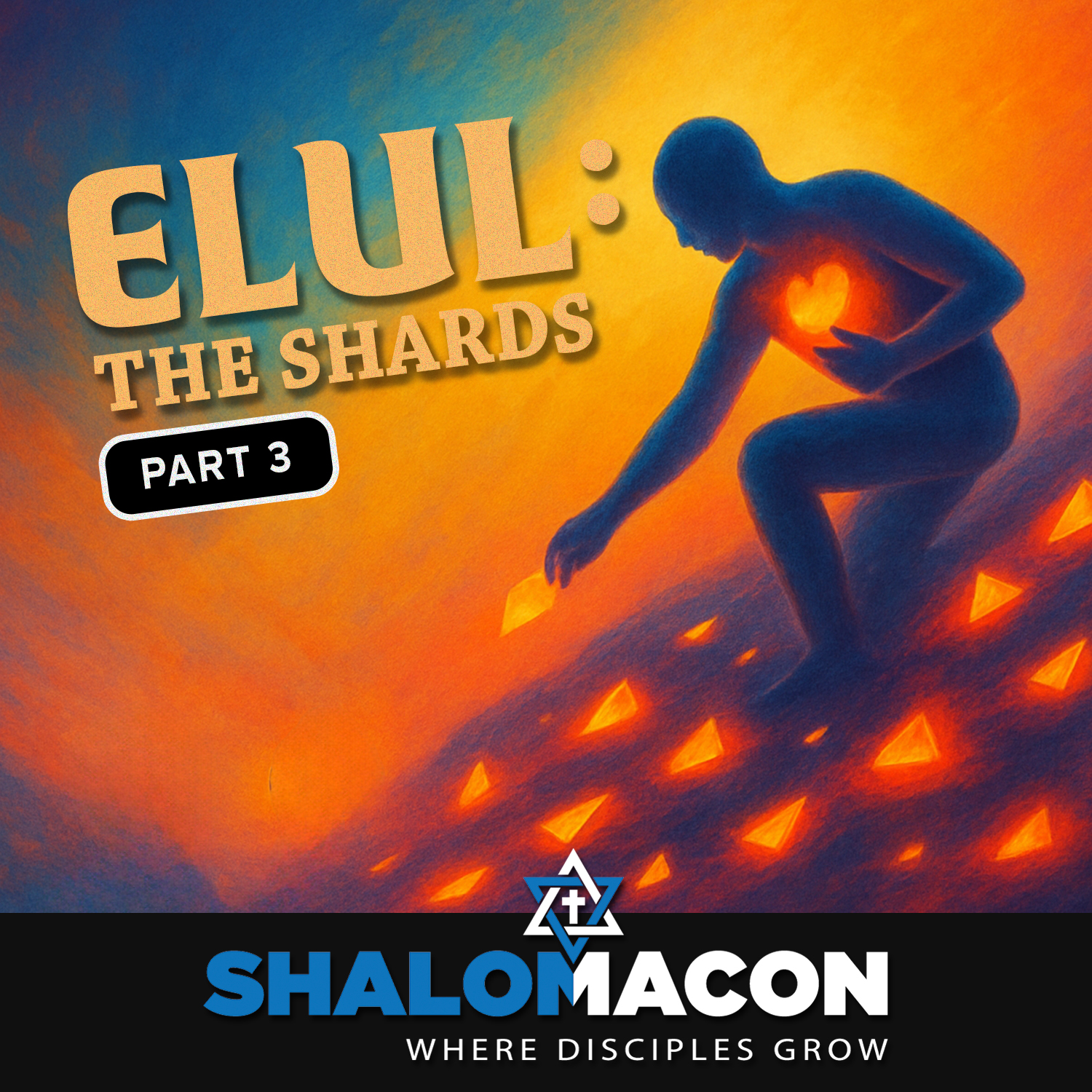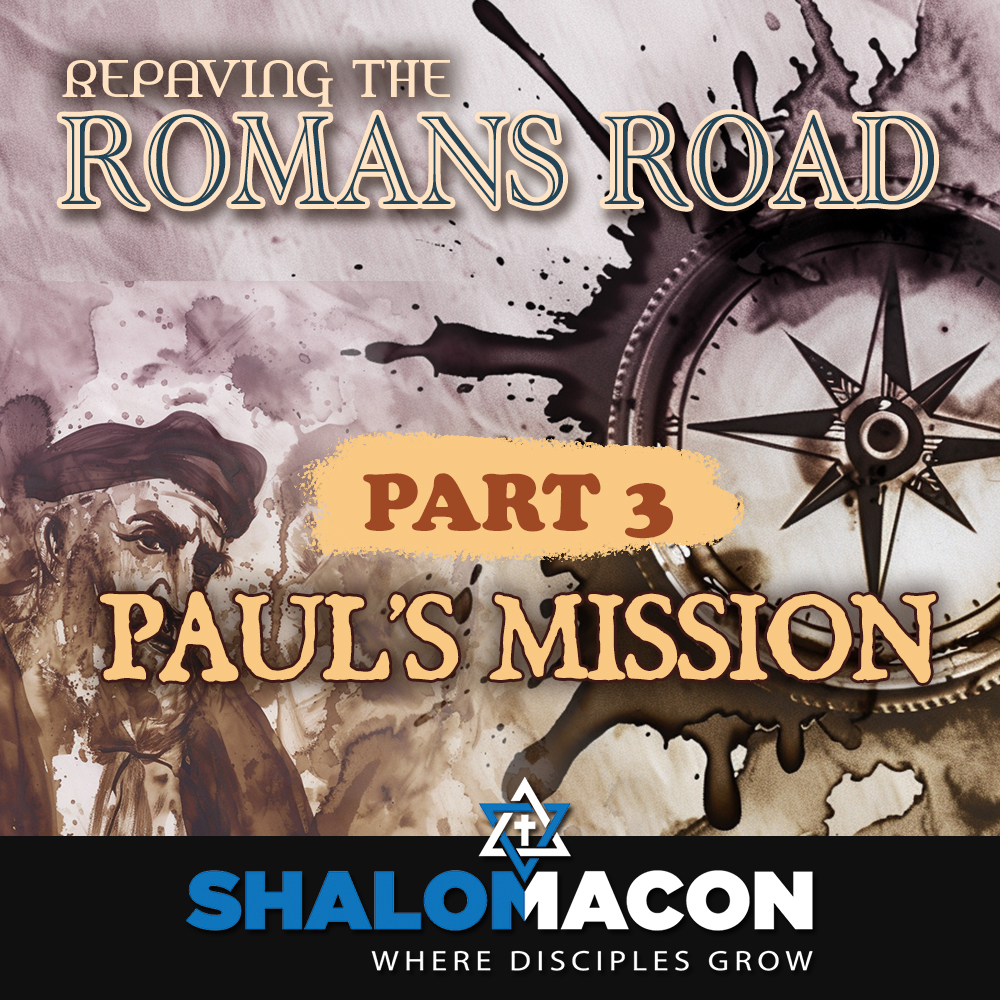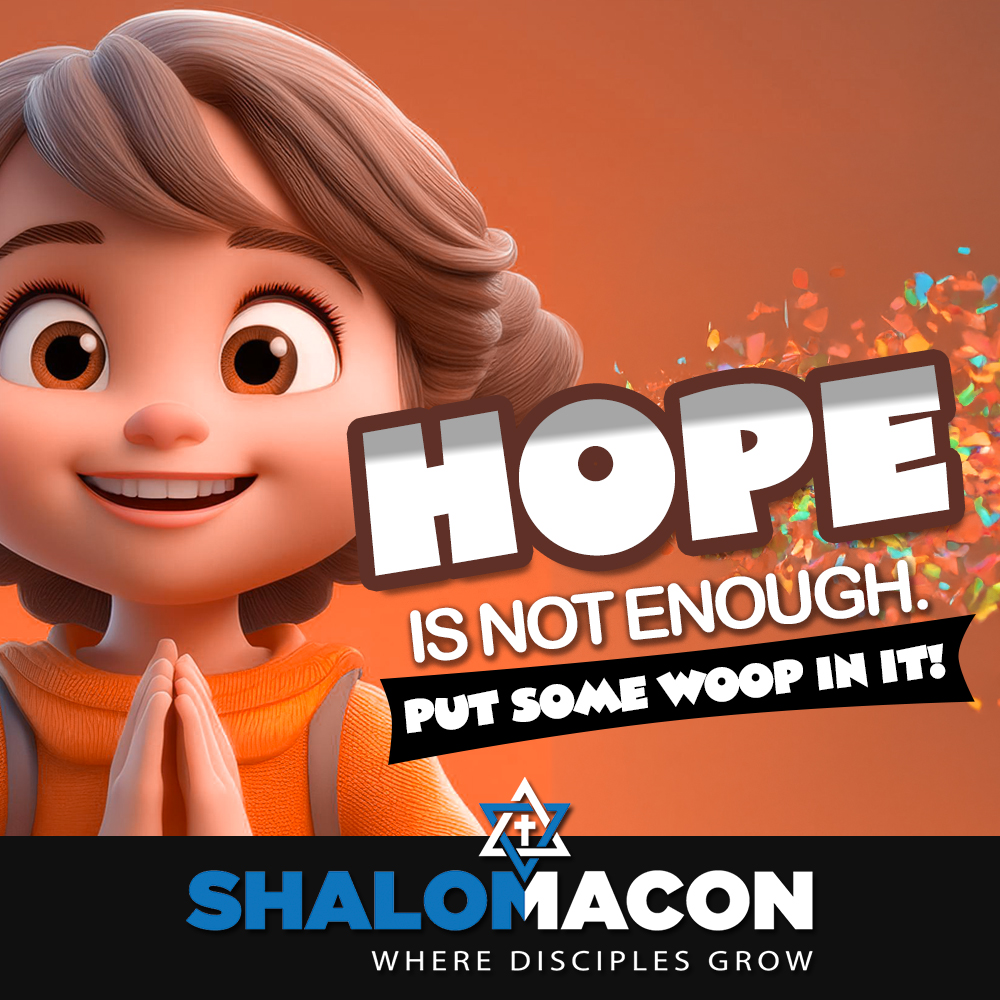Episode Transcript
[00:00:00] It is one of my favorite things that happens in my job. When I sense a direction and I go that way and I teach and talk about certain things and then God in little ways will give me just a pat on the back or an encouragement with some kind of word or content that helps me to know I heard properly. And I love it when that happens. You remember last week?
[00:00:27] Remember that?
[00:00:29] Who's laying on it?
[00:00:32] We talked about the nail the week before. We talked about your high holiday tools, your Rosh Hashanah. I mean, your magnifying glass.
[00:00:44] It should be your Rosh Hashanah. You should make it your own.
[00:00:48] But part of that process, you know, we talked about the inspection and we talked about the mountains that need climbing and to seek out the things that stand in front of us that block the view of what our life could be if we would just take this step and move up the things that keep us in the valley. Because we sometimes hesitate to start the ascent because it is a difficult task.
[00:01:14] I've thought a lot about it. I hope you have thought about it some. But this is the quote that came across my computer as I was writing the teaching. I want you to just put this up here for me real quick and just leave it up for a second.
[00:01:32] Live your life. Each day as you would climb a mountain, an occasional glance toward the summit keeps the goal in mind. But many beautiful scenes are to be observed from each new vantage point.
[00:01:46] Climb slowly, steadily enjoying each passing moment. And the view from the summit will serve as a fitting climax for the journey.
[00:01:59] It's written by someone who. It's written by an author supposedly Harold Melchert. I don't know who he is. And guess what? Neither does Google and neither does AI.
[00:02:10] There's nothing except that quote on the Internet from Harold Melchert. You know who Harold Milkert is?
[00:02:17] God.
[00:02:19] It's a made up thing. God, just put that on there and put a quote there so it would look authentic. From this author, man, that is so awesome. It reminds us that success is sweeter when you savor the path.
[00:02:37] The summit, the summit he talks about. That's a lofty goal, my friends. To climb up to the top of the challenges in our lives and to do that in a matter of weeks, that's an even bigger challenge. Things that we may have been carrying around for decades to deal in weeks. It can be done. But as we discussed last week, the more important part is once you do it, once you do some of it, once you do one thing, you'll know the reward. But not until.
[00:03:10] Not until. But this quote is what this brings to mind, something that we cannot miss for our ascent, and that is that on the journey upward, which is a difficult one, an occasional glance toward the summit keeps the goal in mind. But many beautiful scenes are to be observed from each new vantage point as you climb.
[00:03:39] Last week I mentioned that climb and the scrapes and the scratches and the bruises that we can accumulate as we're doing the work of Cheshbon Hanefesh, the accounting of the soul, of the forgiveness, of the repentance. But there's a positive side to that which this quote makes so beautifully real. Climb slowly, steadily, enjoying each passing moment. Now, what is each passing moment in this process?
[00:04:08] What is that for us? What does that mean? Each passing moment is a unique unit of discovery.
[00:04:17] It's a moment at which we uncover something that needs work and each step toward doing the work. And each moment, most certainly when that work is accomplished and dealt with that, and I'll make that practical in just one second. But for now, those are the passing moments as we stop long enough to think about what we're doing. Hopefully you started thinking about it.
[00:04:50] One of the things that I struggle with every single year I was telling Kelly about it from my frustration again, is that people come to these messages and to these kinds of series and to the holidays. And many people I know are thinking, I'm fine, I'm doing good. Like, my life is not, you know, a disaster.
[00:05:18] I'm fine. I'm at peace with the world, generally speaking.
[00:05:26] But what we talked about is the desire to want to know deeper about why you are, who you are, what you feel. When a feeling or a negative emotion arises in you or someone says something that bothers you is to dig into yourself and say, why do I feel like that? What is causing that?
[00:05:56] Where did that come from? Can I go back to that place and try to touch it again and understand what makes me like I am? Even if on the outside everything is put together, we all have things.
[00:06:16] And so I want to talk to you about the passing moments on the journey to stop and enjoy. When God points one of those out to you and enjoy the opportunity to gather it.
[00:06:32] This is a mixture of Musar and Hasidus, Hasidic Judaism and Jewish ethics. In this lesson, and I've already mentioned the word to you, Cheshbon Hanefesh, we know this, right? Some don't. It means accounting of the soul. It's the work. It's the work we do. It's the thinking. It's the acknowledgement of what needs repair. Cheshbon hanefesh. We're seeking accounting generally to balance the book, so to speak, to try to figure out what's out of balance and bring it back. But let's learn an expansion of that term, Cheshbon hanefesh, which is called tikkun hanefesh.
[00:07:11] Who knows the word tikkun olam? It's two words, actually.
[00:07:15] Tikkun olam. Our task as children of God and disciples of Yeshua is to tikkun olam to bring repair to the world.
[00:07:27] Tikkun means. So what might you think?
[00:07:31] Tikkun hanefesh means the repairing of the soul.
[00:07:40] There is a story of unknown origin. I read it from a rabbi named Rabbi Herman online, but I want to just share it with you real quick.
[00:07:49] On the sixth day of creation, as God was preparing to bring humanity into existence, to bring life to the world through humans, he to bestow upon us this or upon him at that moment, a very unique treasure.
[00:08:06] Nizotzot in Hebrew, nizal tzot. Holy sparks of his own goodness.
[00:08:14] That was a gift that God chose.
[00:08:17] And when the angels heard of this plan, they were discontented.
[00:08:24] They were actually envious, and they were protesting. Why should humans receive a divine gift that they themselves were not given? And their complaints rose to God, and he paused to consider their arguments. And God offered this compromise to the angels. And he said, the humans will indeed get these sparks, but you may decide where they'll be hidden.
[00:08:52] And so the angels gathered to deliberate.
[00:08:56] One of them suggested, will put them at the highest peak, at the highest mountain beyond the reach of mortals.
[00:09:07] But another objected and said, humans are. They're going to be strong. They're going to be determined. They'll learn how to climb even the tallest peaks. Another angel suggested the depths of the sea. They're not creatures of the water. They'll never find them. But a colleague disagreed.
[00:09:25] Another angel raised the objection. Humans are also smart.
[00:09:31] They are wise. They will invent ways to explore the oceans. Even the sea will not keep them away from finding this treasure.
[00:09:39] And one by one, the ideas fell apart. The desert sands? No. The dark forests? No. None were secure enough.
[00:09:48] And frustration was spreading among the angels. Then, in a quiet voice, one angel offered this opinion.
[00:09:55] Place the sparks inside the very humans who will carry them.
[00:10:01] They will search high and low, but never imagine that the treasure of God is hidden within themselves.
[00:10:11] The angels nodded.
[00:10:14] It was a perfect solution.
[00:10:19] And the point, of course, is that it is true that we have the divine within us.
[00:10:26] We have pieces if you will, sparks, according to the story of beautiful components of God. But that story is really actually more than just a tale about creation and these lessons. It speaks to a truth that we feel if we allow ourselves that. Those sparks, that goodness, that essence, the sparks, they can be scattered.
[00:10:51] They can be.
[00:10:55] I don't know. It happens. It happens. Parts of us, goodness, parts of us, through our sins, when we lose our temper, when we act selfishly, when we fail to reflect God's image. So many different things when we ignore the God given potential or his calling in our lives. Sometimes it happens through suffering, sometimes it happens through trauma, through shame, through broken relationships, through regret, through loss.
[00:11:26] That has a way, Life in general has a way of chipping away at us.
[00:11:34] And sometimes we even let other people take those beautiful pieces of us, that beautiful essence, until it feels like our soul is just fragmented, it's scattered about.
[00:11:51] And the High Holidays are definitely about teshuvah, about repentance, about forgiveness toward God and to other people. But there's another really important aspect of the High Holidays, and that is there is a necessary component of them that applies to ourselves, to us, to us, to find what is lost. That is part of the work of Musar, of Tikkun Hanefesh, of repair, repairing. The soul comes in to gather back those shards, to restore what has been scattered, to become whole again with God and within yourself.
[00:12:36] King David prayed in the Psalms, he restores my soul.
[00:12:42] Psalm 116 says, Return to your rest, my soul, for Adonai has been good to you.
[00:12:50] In plain terms, it's really the act of just bringing yourself back to center, with God's help, of course, of collecting yourself and doing the work after you've been thrown off, after you've been scattered. And let me add one more term for you, Hashavat hanefesh, which means the return of the soul.
[00:13:15] The return.
[00:13:16] The returning of the soul. There's a concept in Torah that's called chashavat Aveda, which is the requirement that we have, when we find a lost item, to restore it to its original owner.
[00:13:31] Hashavat aveda, Deuteronomy 20.
[00:13:35] You have to make a concerted effort. But there's a connection between those concepts of hashavat Aveda and hashavat hanefesh to the human journey, to our journey of spiritual self improvement. That spiritual parallel, I hope is obvious, that the Jewish thought, particularly in the High Holidays, the period of Teshuvah, expands this. The lost object, object in this case is our very own soul, those good, good sparks which God Placed within us that become scattered. Those shards which can, however they got that way, misdeeds that you did or hurts that people did to you.
[00:14:28] The spiritual work of Shuva, returning the soul to the source and the true purpose. So I'll put this together for you this way.
[00:14:40] Cheshbon Hanefesh we all have heard it. Accounting the soul, the magnifying glass, the inspection, the honest assessment. It's the process, it's the. We should realize, we should commit to seeing and being honest that parts of us have been scattered. Our goodness, our God given holy spark is scattered. We seek them out, we do the work to look for them. Chashavat Hanefesh we ask that God return our soul, bring this back, our brokenness, our shards. We have to do some of the work for ourselves.
[00:15:18] As one who has found a lost item is obligated to to restore it to its owner.
[00:15:28] We must submit to the work of restoration. And don't we owe that at least to ourselves, to allow God to work within us.
[00:15:39] And finally, the Tikkun Hanefesh element, this repair, which is in some sense, it's a co labor between you and God.
[00:15:47] You have to be involved. Did you know that?
[00:15:55] But we must now allow God to do the work that happens within us. This is our hope. This is our hope.
[00:16:02] Even if your whole picture seems put together, my hope is that you have at least invested and will invest some time in asking those things.
[00:16:17] What is broken can be repaired. What is scattered can be gathered. What is hidden can actually be that bright and shining treasure. And we do that together. Thank God. As a community in these days. I love it.
[00:16:30] My barber was asking me, what's your week look like? I said, oh, buddy, this is when a rabbi earns his keep. It's called the High Holidays. What is that?
[00:16:46] Well, Rosh Hashanah, Yom Kippur, what is that?
[00:16:50] It's the Jewish Christmas and Easter. Just level it up right here. No, I'm kidding.
[00:16:57] It is actually when most Jews go to synagogue like Christmas and Easter, regardless of their commitment.
[00:17:09] But I was explaining to him that it's so much not Christmas and Easter, that it's so much about a community gathering together to be vulnerable together with each other, arm in arm, saying prayers, praising God and asking God, asking God to help.
[00:17:35] And we do it together in these holy, sanctified, proven days. Which takes me all the way back to the beginning of this teaching, which is to read this quote and say to you again, thinking about the journey up the mountain.
[00:17:50] Live your life today, each day as you would climb a mountain. An occasional glance toward the summit keeps the goal in mind. But many beautiful scenes are to be observed from each new vantage point as you go and find and ask God to repair and to restore and to treasure that part of the journey. But please climb slowly, steadily, enjoying each moment. And the view from the summit when you get there will be so beautiful and a fitting climax for the journey you've ventured to take.
[00:18:32] As we enter Monday night into the high holy days, high holidays, we've stood at the bottom of the mountain. I hope you have. We assess ourselves, our shortcomings. We use the glass. We've looked up to the summit.
[00:18:51] We've identified at least a goal. I hope at least one thing, maybe one thing. And that's fine. We commit to the climb. Monday, Tuesday morning. The sound of the shofar, you know what that is? That's the alarm. That's the wake up.
[00:19:12] That's the alright, let's do it.
[00:19:18] Yallah.
[00:19:25] It's a time to surrender.
[00:19:28] And whatever God may reveal in our experiences, may it be in services often, for me, it's not. It's just not.
[00:19:35] It's in times of private and personal reflection and seeking God, often early.
[00:19:45] But may he help us to see the summit. We want to arrive there. We know there is better, we know there is fuller, we know there is more abundant life.
[00:19:56] There always is, because God is infinite and his gifts are infinite.
[00:20:05] So that's our goal.
[00:20:09] In 10 days from Rosh Hashanah, as the gates close for Neelah and Yom Kippur, we pray that Hashem will come to our aid, as David prayed. Restore me, O God, restore my soul.
[00:20:22] That's the goal. But stop and don't miss it.
[00:20:29] Don't miss the journey. Many beautiful scenes climb slowly. Scattered across this mountain is the journey of collecting those parts. Now I want to quote something else from Rabbi that shared that angel story. The divine sparks are not buried on the mountain. They're not hidden in the sea, in the depths. They're hidden in you.
[00:20:51] And when we relinquish them, we must seek them out and ask God to restore us. But these are the beautiful scenes, as I said. And we climb slowly. And I am not claiming, of course, for those literalists, that the soul literally breaks into parts and you're completely broken and done.
[00:21:09] It's an illustration, a beautiful one.
[00:21:15] The shards are the metaphor for the fragmentation of our attention, of our holiness, of our kindness. And through teshuvah, through mitzvot, through acts of kindness, we gather those things, that is tikkun Hanefesh.
[00:21:31] There's a rabbi, Rabbi Shapira, who was speaking in the Warsaw ghetto on Rosh Hashanah in 1941.
[00:21:40] Imagine the circumstances.
[00:21:43] And he said the Hebrew word chuva means repentance and return. But it's not that simple. It's not a simple return. We return to who we are meant to be, but have not yet become.
[00:21:58] And I'll talk to you on Shabbat Shuva about that, the Shabbat of return. But we return to the growth and the possibility that has lain dormant with every us and has not yet flourished. We must also connect with those parts of us along the way which we have not utilized to their fullest extent.
[00:22:20] Rabbi Nachman speaks of Hashavat ha nefesh, the return of the soul. He teaches that we should seek out Nekudah, Tovah.
[00:22:31] Good point.
[00:22:33] A good point. Even when one feels desperately low, even when we've fallen, find one good point, then another, then gather them. And it's a method for returning to God. Step by step, point by point, the scattered self comes home. And the shards, you know, this is the reminder that I got for our shards.
[00:22:59] Okay? It's a beautiful graphic. I love it. It says everything right there.
[00:23:03] Those shards. This is bark, but it's a shard.
[00:23:11] Why bark?
[00:23:14] The reason is because the scripture calls us in. Psalm 1, it says that a righteous person will be like a tree planted by streams of living water.
[00:23:28] And you see, trees can weather storms. But sometimes lightning strikes or wind comes and tears at the bark and pieces fly. And when storms hit us, we can feel the same way.
[00:23:43] We really can.
[00:23:45] We are still a living tree, but a storm has tossed pieces. And when we do things, when that happens to us, like bolts of lightning, sometimes it takes us and it breaks us and it splits us and splinters us. So the shard, the piece I want you to see, and I'm putting them in a bowl over here on this tzedakah box, right in between those doors. When we leave, I want you to pick one up or family online. Go out in your front yard, pick up a piece of bark, or go on a long wood walk. Walk in the wood and ask God things while you're there. And pick up a piece of bark, a shard.
[00:24:30] And I want you to keep it with you during the holidays. Put it in your pocket, your desk. Don't just throw it next to your other toys.
[00:24:38] They're not toys, they're tools.
[00:24:42] Put it where you see it. And I want you to think of yourself collecting the shards on the journey, the pieces.
[00:24:53] And I know, yes, I'm very aware. Guess what? This piece of bark that was blown off of a pine tree, it can't be put back on.
[00:25:06] But your shards can.
[00:25:10] Your God can restore all that is lost within you, and he can put you together in a way that will transform you forever.
[00:25:30] And God can do that.
[00:25:33] And he will do that. So you take this very, very literally. You take a shard and you say, think of the shards we're collecting. I've lost patience. I've been unkind. I've wounded others. I've hurt my. I've not been generous. I've squandered my talents. I don't know what the list is. I've grieved the spirit. My eyes have sinned, My mouth has sinned. But with each act, part of you just was splintered away.
[00:26:03] And so, as we make our way to Monday, I'm asking you to be intentional, to seek them out and gather them and bring them and hand them to reclaim it. To have sought it out, to have found it, to have identified it, and to give it to God that he might tikkun hanefesh, that he might repair it. And each one you can view as a nekudatovah. A good point.
[00:26:41] And you can add them one upon another, and to celebrate them and to be grateful for them. With each beautiful passing moment to be changed along the climb to the days of awe, many beautiful scenes are to be observed. The summit will be all the sweeter when you savor the path. And we've arrived. Monday, Tuesday. Yom Teruah, the festival of trumpets. The shofar begins this process. The books are open. We've conducted the investigation. What do you want out of it?
[00:27:14] What do you want to get?
[00:27:16] I can't tell you. And you can dismiss it. That's up to you.
[00:27:24] Glance at the summit, but savor each step. And now your inspection can lead to an expectation that we expect God, if we've done our part, to restore, to bind the pieces and to lift us higher. And so I pray that at Nilah we all stand together, repaired and restored to God, to those in your life, and to the full greatness that you can be.
[00:28:02] I'll see you at the summit.
[00:28:04] Shabbat Shalom. I'm Darren with Shalom Macon. If you enjoyed this teaching, I want to ask you to take the next step. Start by making sure you subscribe to our channel. Next, make sure you hit the like button on this video so that others know it's worth their time to watch last Head over to our website to learn more about Shalom Macon, explore other teachings and events, and if you're so inclined, and contribute to the work that we're doing to further the Kingdom. Thanks for watching and connecting with Shalom Macon.



